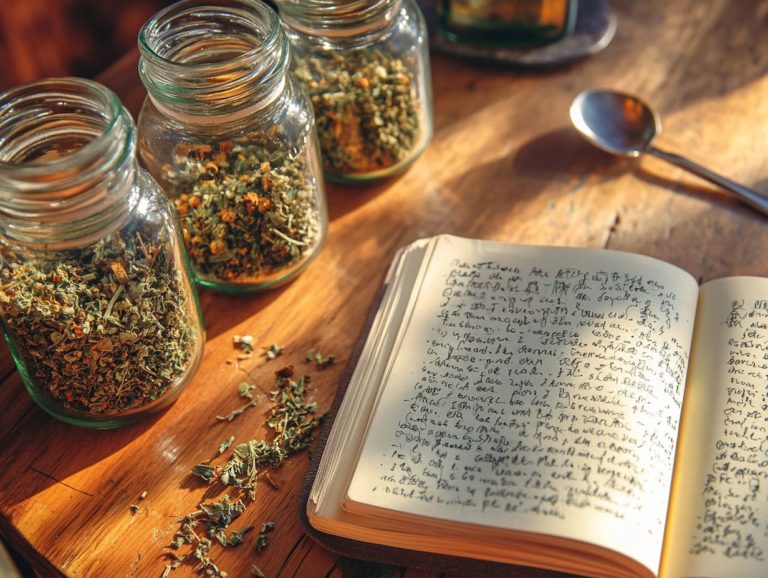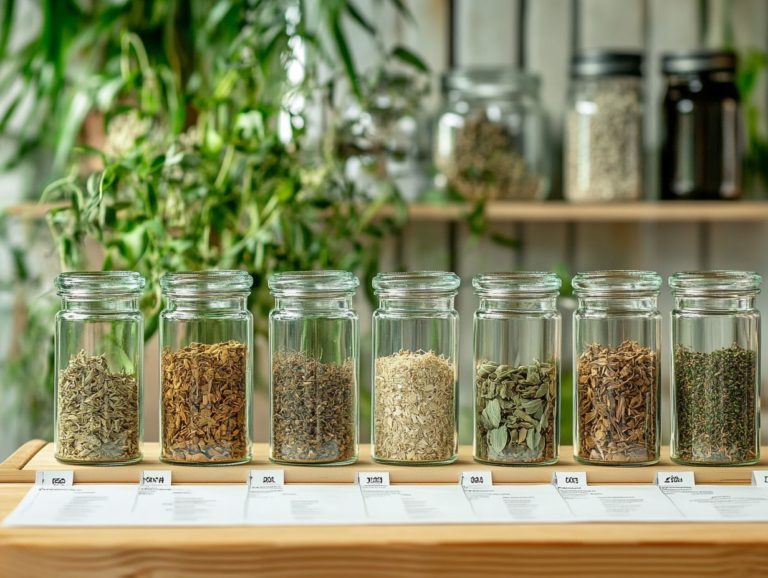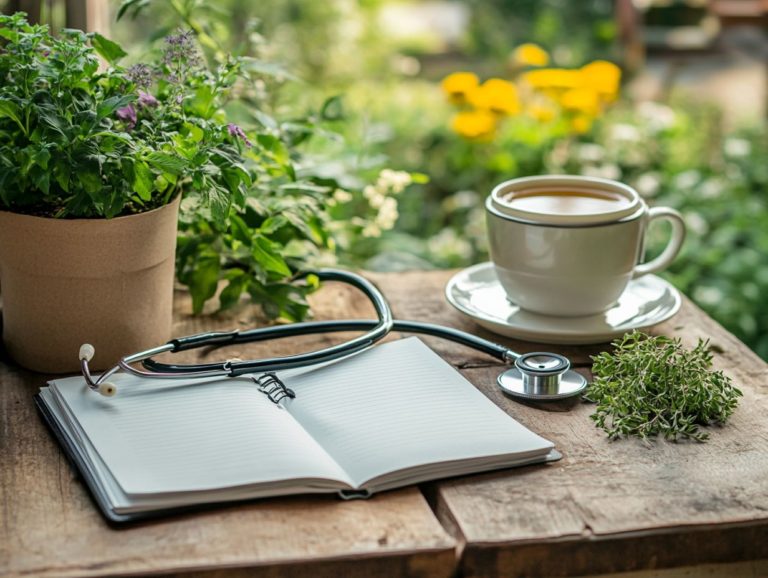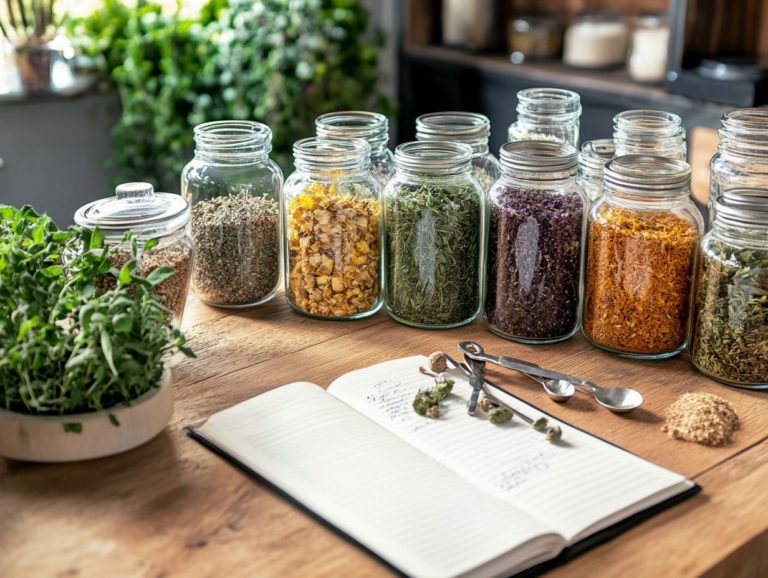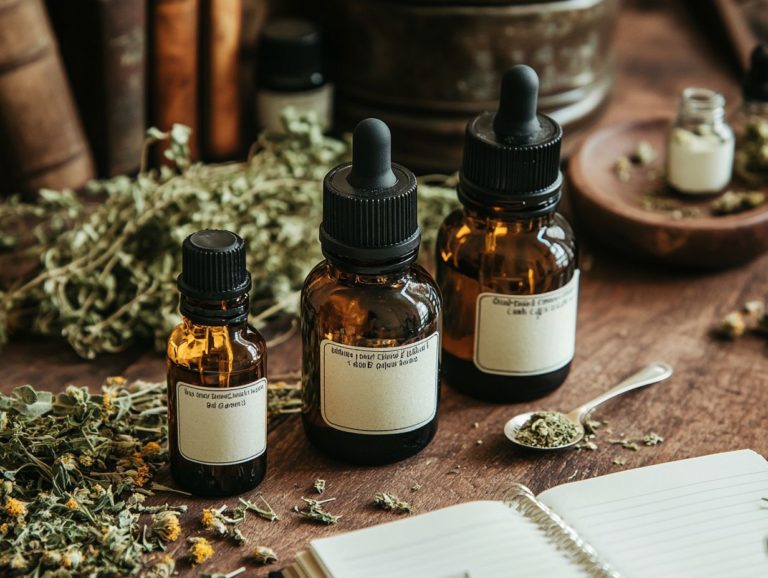Herbal Preparations: Dosage Tips for Beginners
Herbal remedies are becoming more popular because of their natural healing properties. However, the world of herbal preparations, including various dietary supplements, can be overwhelming, especially for beginners.
This article breaks down the essentials, starting with an overview of the different types of herbal preparations available, including herbal tinctures and other herbal products. It explores the factors that influence dosage, emphasizing the importance of individual differences and key considerations, such as FDA warnings regarding certain herbal supplements.
You will also discover practical tips for beginners, effective measuring techniques, and guidance on how to monitor and adjust dosages as needed when using herbal supplements. By the end, you ll feel empowered and ready to dive into the world of herbal remedies!
Contents
- Key Takeaways:
- Understanding Herbal Preparations
- Factors Affecting Herbal Dosage
- Individual Variations and Other Considerations
- Recommended Dosage for Beginners
- General Guidelines and Tips
- Measuring Herbal Dosage
- Methods and Tools for Accurate Measurement
- Monitoring and Adjusting Dosage
- Frequently Asked Questions
- What are herbal preparations and why are they beneficial?
- What are some common types of herbal preparations?
- How should I determine the right dosage for herbal preparations as a beginner?
- Are there any safety precautions I should take when using herbal preparations?
- Can I mix different types of herbal preparations together?
- How can I incorporate herbal preparations into my daily routine?
Key Takeaways:
- Before starting any herbal preparation, consult your healthcare provider to ensure safety and proper dosage.
- Factors such as your age, weight, and health can affect herbal dosage, so begin with small amounts and gradually increase as needed.
- Using tools like droppers, scales, and measuring spoons can help you measure accurately. Always monitor for any adverse reactions and adjust the dosage accordingly.
Understanding Herbal Preparations
Understanding herbal preparations is crucial for anyone eager to benefit from the medicinal properties of herbal remedies, dietary supplements, and holistic health practices. These preparations include a range of products, such as liquid herbal extracts, teas, herbal capsules, and more, all derived from plants known for their healing properties.
While herbal medicine has a rich history that goes back centuries, it s important to understand its role in modern healthcare, especially concerning safety precautions and possible side effects related to specific herbs, such as Kava, which can harm the liver, and St. John s Wort.
Types of Herbal Preparations
You have a variety of herbal preparations at your disposal, each offering unique benefits and uses in health care and home remedies.
For example, herbal teas are soothing drinks made by steeping plants in hot water. When made correctly, they can extract beneficial compounds that promote relaxation or aid digestion. On the other hand, tinctures are liquid herbal extracts made with alcohol or water and provide rapid relief for various issues, from anxiety to inflammation. This makes them popular in complementary and alternative medicine.
If you prefer convenience, capsules allow you to easily add herbs like turmeric or echinacea into your daily routine without any unpleasant tastes. Then there are herbal extracts, known for their strong medicinal qualities, that can effectively address specific health concerns such as immune support and digestive wellness.
Each of these preparations taps into the therapeutic potential of popular herbs, making them valuable allies in your journey towards overall well-being.
Factors Affecting Herbal Dosage
Several factors can influence the ideal herbal dosage for you. It s crucial to consider your health history, age, weight, and any medications you are currently taking before adding herbal remedies to your routine.
Individual Variations and Other Considerations
Individual variations play a significant role in the effectiveness and safety of herbal dosages. This is why herbalist training is so valuable.
Factors like your genes, current health conditions, and lifestyle choices greatly influence how you respond to herbal preparations. For instance, if you tend to metabolize certain compounds quickly due to your genetics, you might require lower dosages to avoid any adverse effects from herbal medicines. It’s important to learn how to measure herbal dosages accurately to ensure safety and effectiveness.
On the other hand, if your metabolism is slower, you may find that higher amounts are necessary to achieve the same therapeutic effects, particularly with strong herbal products. For accurate guidance, refer to the dosage recommendations for popular herbs.
Health conditions, such as liver disease or issues related to kava, can alter how your body processes herbs. This makes it crucial to approach dosage with caution. Your lifestyle choices such as diet, exercise, and stress levels as well as your use of herbal supplements can also affect how well herbs work for you.
For example, someone who maintains an active, balanced lifestyle may absorb and utilize the benefits of herbs differently from someone who is more sedentary.
These factors underline the importance of personalized recommendations for determining the right dosages tailored to your needs. Research from reputable institutions like the NIH and NCCIH can also guide these recommendations.
Recommended Dosage for Beginners
As a beginner, it’s exciting to explore and establish a recommended dosage for herbal remedies, especially when considering FDA guidelines on herbal supplements. This keeps you safe and helps you make the most of these remedies while minimizing any potential side effects.
General Guidelines and Tips
When you’re just starting with herbal supplements and creating your home apothecary, it s important to ease into the process. Pay close attention to how your body reacts to different remedies.
To establish a safe and effective routine, consider keeping a journal to document your experiences with herbal products. Note any changes in your mood, energy levels, or side effects you might encounter. This practice fosters self-awareness and provides valuable insights for discussions with healthcare providers, who can offer you tailored advice.
Researching the specific medicinal properties of each supplement and their compatibility with other herbal remedies is also vital. Understanding their unique benefits and potential interactions can greatly impact their effectiveness and safety.
By taking these thoughtful steps, you can navigate your herbal journey with confidence and clarity, informed by knowledge from experts like Linda J. Vorvick, MD, and John Gallagher.
Measuring Herbal Dosage
Accurately measuring herbal dosage is essential for maximizing the therapeutic benefits of herbal tinctures and preparations while minimizing the risks associated with improper usage.
By ensuring precise measurements, you can harness the full potential of these natural remedies and enjoy their medicinal benefits, enhancing your overall experience and outcomes.
Methods and Tools for Accurate Measurement
Using the right methods and tools for measuring herbal dosages is crucial for ensuring the efficacy and safety of your herbal tinctures and supplements.
For instance, while measuring spoons may seem convenient for simpler herbal mixtures, their size variability could result in inconsistent dosing, which you want to avoid. In contrast, digital scales provide a level of precision that ensures each dose adheres to recommended guidelines, especially when working with potent extracts. To learn more about proper dosing, check out understanding herbal dosage.
Droppers are also handy for liquid tinctures, allowing you to dispense small volumes with accuracy. By mastering the calibration of these tools and integrating them into your daily practices, you can elevate your herbal experiences and enhance your overall well-being through informed usage of herbal tea recipes and supplements.
Monitoring and Adjusting Dosage
Monitoring and adjusting dosage is key to safely incorporating herbal remedies into your health regimen. This approach allows you to effectively respond to any side effects or signs of intolerance, creating a balanced and personalized experience in your wellness journey.
Signs to Look Out for and How to Adjust Dosage
Recognizing bad reactions is crucial when using herbal remedies, especially those like Kava and St. John’s Wort. This awareness helps you make necessary adjustments to the dosage of herbal preparations for optimal safety and effectiveness.
Be on the lookout for common signs like gastrointestinal issues, such as nausea, bloating, headaches, or even unusual fatigue. These may indicate problems with certain herbal supplements. If you notice any adverse reactions, it’s wise to reassess your dosage; sometimes lowering it can provide relief without sacrificing the benefits. Understanding the role of body weight in herbal dosage can also be helpful. Keeping a journal to track your symptoms alongside specific dosages of various herbal remedies can be a game changer in identifying patterns.
Always chat with a healthcare provider or herbalist to get personalized advice tailored to your unique health needs. This ensures that your approach to herbal remedies and dietary supplements, including herbal dosage guidelines for pregnant women, is both safe and informed.
Frequently Asked Questions
What are herbal preparations and why are they beneficial?
Herbal preparations are natural remedies made from plants that have been used for centuries to treat various ailments. They are beneficial because they are gentler on the body compared to synthetic medications and often have fewer side effects.
What are some common types of herbal preparations?
Common types of herbal preparations include tinctures (concentrated liquid extracts from herbs), teas, capsules, and essential oils. Each type has its own unique benefits and can be used for different purposes in health care.
How should I determine the right dosage for herbal preparations as a beginner?
Always consult with a qualified herbalist or healthcare professional to find the best dosage for your needs, especially considering FDA warnings. Dosages can vary based on age, weight, and overall health.
Are there any safety precautions I should take when using herbal preparations?
Don’t skip consulting professionals your health matters! It’s crucial to consult research and professional advice to ensure safety and efficacy while using herbal preparations, as they are not intended to prevent or cure any health conditions without proper oversight.
Organizations like the American Cancer Society and the NIH NCCIH provide important insights into various complementary and alternative medicine practices, highlighting the importance of informed decisions when using herbal medicines.
For those interested in learning more about herbal remedies, resources such as Alchemy of Herbs and guidance from Linda J. Vorvick, MD at the University of Washington can be valuable. In your journey with herbal preparations, it’s beneficial to explore their medicinal properties and benefits as part of a home apothecary. Always be aware of FDA warnings related to herbal supplements.
While herbal preparations are generally safe, it is important to follow the recommended dosage and pay attention to any potential interactions with medications you may be taking. For those just starting out, exploring 5 essential herbal preparations for beginners can be particularly helpful. Pregnant and breastfeeding women should also consult with a healthcare professional before using herbal preparations.
Can I mix different types of herbal preparations together?
Mixing different herbal preparations isn t usually recommended, as they can have different effects on the body. It s best to stick to one type at a time and consult with a professional before combining different herbs.
How can I incorporate herbal preparations into my daily routine?
There are many ways to incorporate herbal preparations into your daily routine, such as adding herbal teas to your morning regimen or using essential oils in a diffuser. Always follow the recommended dosage and consult with a professional for optimal results.
Explore herbal preparations further and discover their potential benefits for your health!

